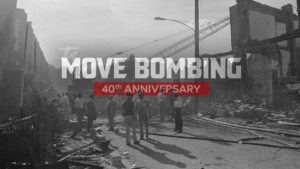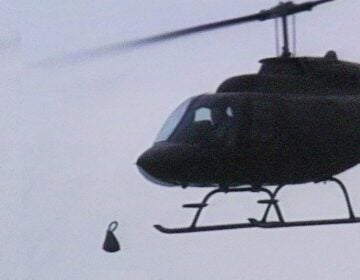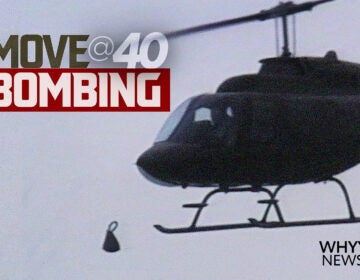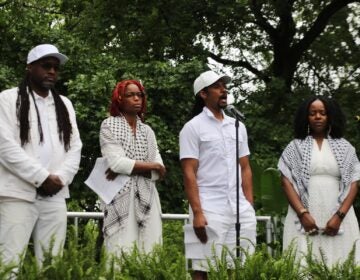Former Mayor W. Wilson Goode Sr.: Philly must apologize for MOVE bombing 35 years ago
Former Philadelphia Mayor W. Wilson Goode Sr. is calling on the city to issue a “formal apology” 35 years after the MOVE bombing that killed 11 people.

Former Philadelphia Mayor W. Wilson Goode Sr. speaks to supporters, as protesters demonstrate in the background, during a ceremony to celebrate the naming of a street after him Friday in Philadelphia. (AP Photo/Jacqueline Larma)
Updated: 4:35 p.m.
Thirty-five years ago this Wednesday, Philadelphia police dropped a bomb on the home of a radical Black liberation group called MOVE. Now, the city’s mayor at the time says another apology is due to the families of those who were targeted and killed, and the rest of the city’s residents.
“I believe that it would be helpful at this point for current and former officials to apologize,” said W. Wilson Goode Sr.
In a phone interview with WHYY, Goode echoed what he wrote in an op-ed published Sunday in The Guardian. He said a “formal apology” on the 35th anniversary of the tragic bombing would help the city heal and move forward.
“That way we can begin to build a bridge that spans from the tragic events of the past into our future,” Goode wrote. “Many in the city still feel the pain of that day. I know I always feel the pain.”
Goode was mayor when the bomb killed 11 MOVE members, including five children, and destroyed 61 homes in the neighborhood.
Goode apologized for the events that took place in West Philadelphia, noting this is the fourth time he has done so publicly, including the day after the bombing.
Years of tension lead to a breaking point
The fraught history between the city and the MOVE organization went back years before the incident on May 13, 1985.
In 1978, police tried to evict MOVE members from another home in Powelton Village over more than a years’ worth of neighbor complaints about noise and health violations. Authorities came armed with water hoses and tear gas. Police Officer James Ramp was fatally shot in the altercation — who shot him remains a topic of debate — and nine MOVE members received lengthy sentences for murder. (As of February, seven of the nine have been released on parole. Two others died in prison.)
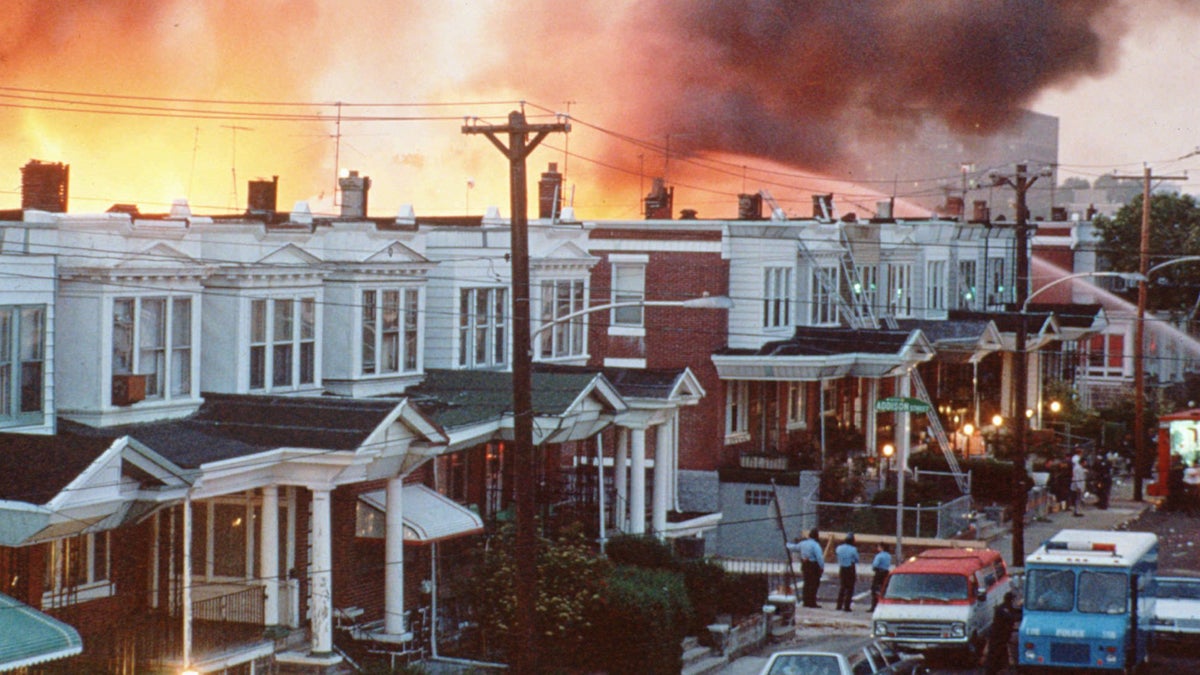
Seven years later, police and members of MOVE would have a much deadlier encounter.
By then, the organization had set up a new home in the Cobbs Creek section of West Philly and tensions between neighbors, the city and MOVE members continued to flare over how the group lived out its radical back-to-nature philosophy. Neighbors on the 6200 block of Osage Avenue remember MOVE members set up a stage, where some would use loudspeakers to espouse their beliefs, even in the middle of the night.
The bombing killed almost every person in the MOVE home — only two people survived. But the damage went beyond MOVE’s membership as the city made the decision to let the subsequent fire burn through dozens of rowhomes.
In all, 61 homes were razed. It’s cost tens of millions to rebuild the homes, which have only recently attracted buyers.
Goode said with the last of the MOVE Nine on parole and the upcoming 35th anniversary of the bombing, it’s only appropriate for a new public apology from the city. He said the op-ed was his renewed apology, though as he has said previously, Goode insisted he did not intentionally harm anyone.
“I did not know that the police department was going to take a helicopter and fly over the house and drop an explosive device from the helicopter to the roof,” he told WHYY. “I did not know they were going to let the fire burn.”
Goode testified before an investigating commission in 1985 that he gave his permission to drop the bomb, but did not know it would be dropped from a helicopter. Leo A. Brooks, the city’s managing director at the time, said he had informed Goode of the police department’s plan before it happened.
Goode said he screamed at the television screen for the blaze to be put out and tried to issue the command from his office. Still, he admits the bombing and ensuing fire happened on his watch.
William Richmond, fire commissioner at the time, said in 2010 that the fire which spread down the block was not extinguished immediately after the bomb because officials were worried that firefighters could face gunfire, and thought it would destroy a bunker and help get people out of the house. Goode said he ordered the fire to be put out, but Richmond said he never received such an order.
One of the survivors, Ramona Africa, alleged that police opened fire on MOVE members trying to flee the burning home.
MOVE members rejected the apology idea Sunday, characterizing it as an insincere ploy.
“No apology is going to bring back my baby or any of the children in that house or our brothers, husbands, sisters” or other victims, Sue Africa said.
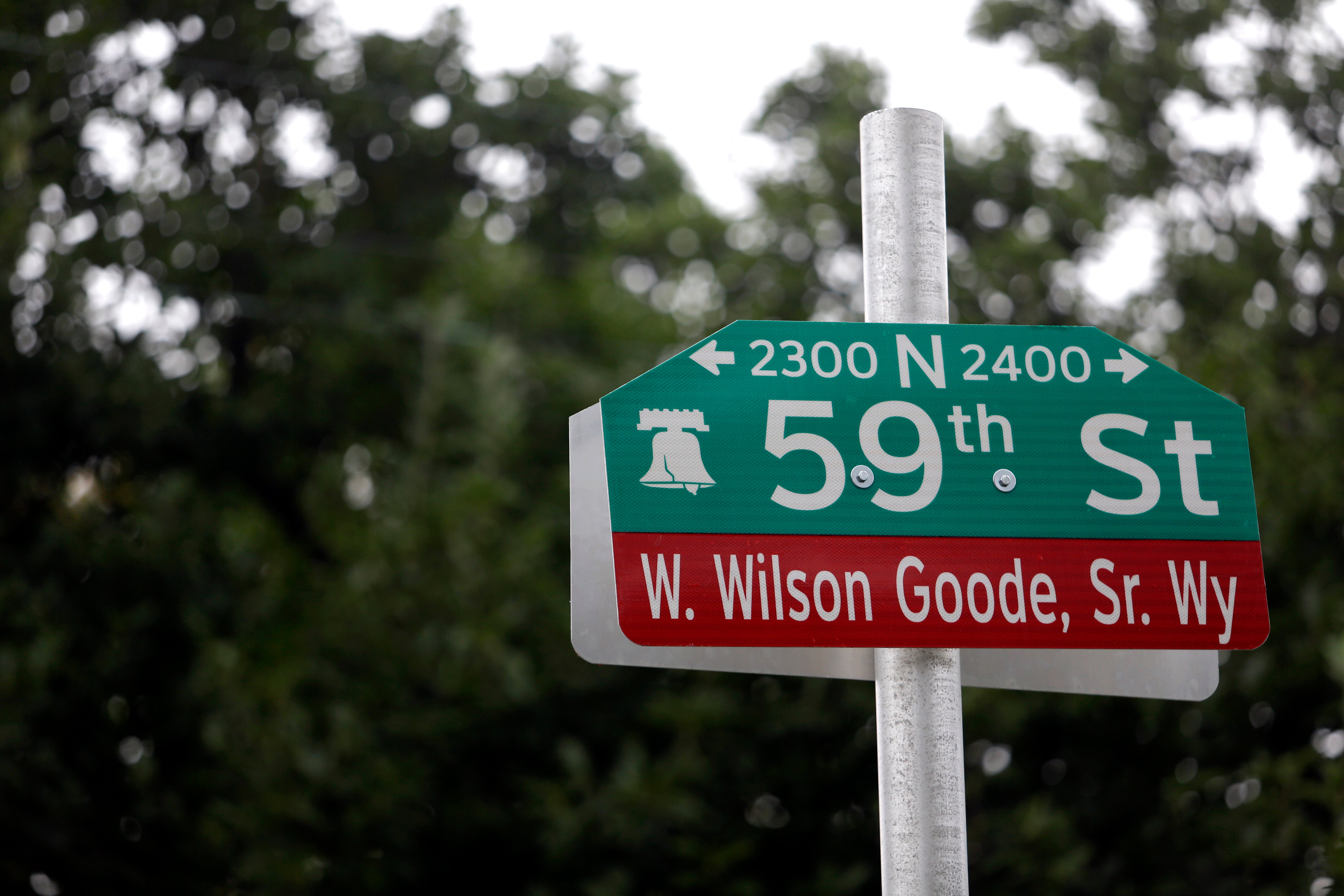
Council considering an apology
Though Goode was re-elected and had a city street named after him in 2018, his handling of the bombing was widely criticized from the start. Fellow politicians urged him to step down and a commission found the mayor had been “grossly negligent” in his handling of the incident.
“I know I can’t change the past by apologizing, but I can express my deep and sincere regrets and call upon other former and current elected officials to do so,” Goode wrote. “I believe this action can be a small step toward healing. I apologize and encourage others do the same. We will be a better city for it.”
In addition to the op-ed he penned in The Guardian, Goode is slated to speak about the bombing on WURD this Wednesday.
Mayor Jim Kenney’s office declined to comment at this time.
City Council is considering a form of apology ahead of the anniversary. Councilmember Jamie Gauthier, who represents the West Philadelphia neighborhood, told The Guardian that she supports the effort.
“To this day this represents one of the most heinous acts done by a city government against its own people — not just in Philadelphia, but in the entire country.”
The Associated Press contributed reporting.
WHYY is your source for fact-based, in-depth journalism and information. As a nonprofit organization, we rely on financial support from readers like you. Please give today.




